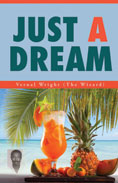
 |
with arms open wide as the wings
of birds and float in the sky like fluff from
summer plants."
Wright refers to his collection of poems as a “dangled bone to a hungry dog,” and like a dog’s hopeful hunger for that bone, we humans are a hopeful species waiting for what comes next in this uncertain life. Through his writing, Wright explores the intricate relationships between man and the natural world, examining how external forces shape our responses and affect our emotional state. While his diction is simple, his ideas are complex. Day and night often bleed together, and the poet seemingly moves in a metaphorical dream state, pondering deep questions with vague answers.
Nature dominates the poems assembled here, while the idea of mortality permeates them. There is an equal mix of melancholic and joyful poems that portray the poet’s wandering, dreamy perspective. Some simply marvel at and appreciate nature’s gifts. Some lament unrealized potentials and dreams, and others explore universal themes of love and loss. The subjects are varied and deal with both animate and inanimate subjects such as pianos, fruits, flowers, stags, birds, and even napkins.
“Flying Bird” conveys the poet’s envy and desire to be in flight with the bird for “delightful dreams” and “to roam and roam / till time take its toll.” In “Scattered Leaves,” Wright observes the mysterious passage of time, juxtaposing a common element of nature with the emotional despair of a man lost. The opening lines read:
I’ve been lost and scattered like dry leaves
in the wild, wild tempest that blew from
dusk to dawn.
“Rooster” projects a lighter mood, celebrating the rising sun of a new day. Wright paints a vivid image of daylight warming the world and of animals that one would typically find on a farm welcoming the radiant morning. By stark contrast, the darker poem “Before Dogs Bark” exudes a more menacing tone where “dogs / of all creeds embrace the shadows” and the night creeps “like a masked face / protruding from the dark.”
In the contemplative poem, “Glass,” Wright asks a question as old as time: Who am I? In the voice of a narrator without the aid of glasses or a hearing aid, the sense of confusion is doubly felt.
Who am I?
What am I?
What am I looking for?
Where am I coming from?
Where am I going?
I can neither see nor hear anything.
My glasses and hearing are
nowhere to be found.
Darkness and sound, hear my cry
“I Don’t Know” is a nightmare within a dream of the fear of the unknown in both life and death. “Piano” praises the sounds of music and love, while in “Words” the poet expresses sadness in leaving for work, leaving behind home and love until the elation fills him again upon his return. Finally, “The Fire Is Out” gives a visceral image of the final fires of the day before the coming darkness.There is no particular order or organization of the poems that is evident here. All offer the reader a glimpse of the poet’s imaginative range and contemplative thoughts. An interesting biographical note tells how Wright (who refers to himself as The Wizard) found inspiration for these poems when he read the words of an unknown poet while waiting for a passport photo. What those words were is not revealed to us, but whatever they were they awoke within the poet a deep-seated need to explore the world around him, to discover what is his place is in this vast planet we call home. He offers an assurance of hope for those of us feeling adrift in a puzzling universe, constantly reminding us of the familiar adage that life is but a dream.